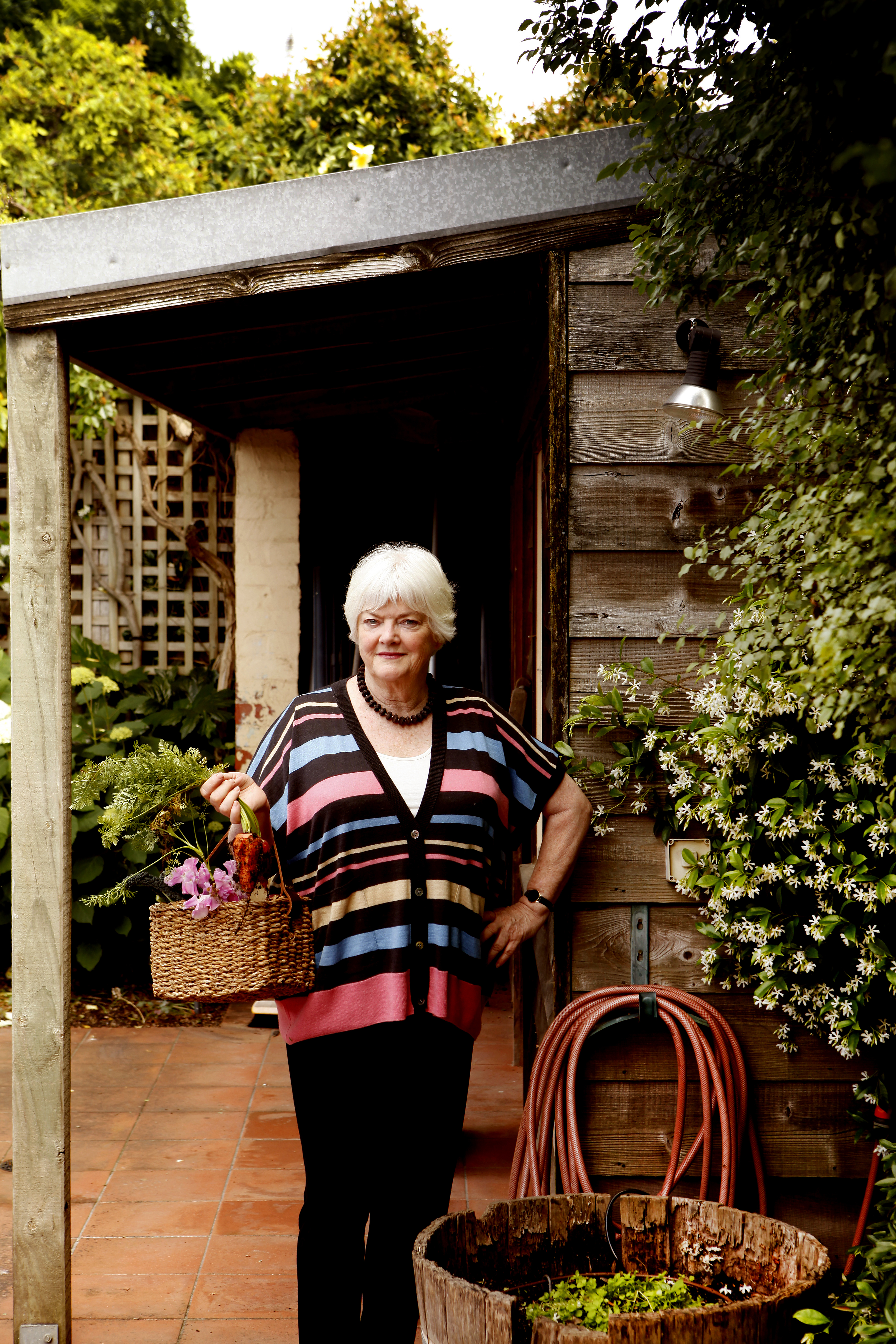By PETER WILMOTH
If I told Stephanie Alexander everything about the food journey of me and my kids – a true confessional – I think we’d be talking a good pass, but could use some work.
Yes, it’s never McDonald’s (well, once). Yes, it’s never KFC. Yes, we set the table and talk over dinner. Yes, at the impassioned request of an 11 year old we sometimes eat at the coffee table in front of Modern Family. Yes, we eat fresh produce nicely cooked.
But all we eat from my garden is sprigs from a rosemary bush. I tried to grow basil and parsley. Disaster. My two lemon trees are on life support. The hydrangeas are rocking, but you can’t eat those. I’m no green thumb. Anything that stays alive in my garden is a happy accident.
I’m probably like a lot of other people who are forced to go to the supermarket to buy manky clumps of basil sweating away in plastic, use four leaves and watch the rest blacken in the fridge.
It’s not like I haven’t had exposure to this way of thinking. My father was a skilled vegetable gardener and my mother’s passion was the garden.
Anyway I try, but I’ve got a lot of work to do. That’s why a tour by Stephanie Alexander of her famous garden and its superb produce leaves me with mixed feelings: first, slight shame about my own pathetic efforts; and second admiration that much of what ends up on Alexander’s dinner plate comes from here.
I have visited Alexander’s Hawthorn home to talk about garden philosophies, and what better place to do that than here? Alexander shows me the lemon-scented verbena, green beans, the last leeks of the season, zucchini, cucumber, tomato, carrots, red and green capsicums, snow peas, peaches, nectarines netted off against possums and crab apple.
It’s a privilege to see Alexander’s food philosophy made real. In this age of obesity, heart disease and a disconnect from what’s in the earth, I asked Alexander where we are with children coming to some understanding of growing and eating good food, and an idea about a sustainable future, the food chain of experience.
“I am of the opinion that children’s knowledge and attitudes towards everything to do with food and sustainability is primarily influenced by what’s happening at home,” she says. “And where there aren’t positive models at home. Children need some sort of assistance if we think it’s valuable that they understand about the growing world and flavour and texture, which I of course do.
“In many families things have been allowed to slide. Plus, you have a phenomenon where many people who are 40 and 50 — many didn’t have a good culinary education themselves so they grew up eating whatever was put in front of them without thinking about it too much. And if they haven’t had a situation where everybody eats together at home regularly they’re missing out on something really major.
“And by the time they get to primary school children have an extremely restricted palate, don’t have any understanding of how food is grown or the sorts of things you have to do to keep things alive in the garden, they probably have very little understanding, if any, of seasons. They don’t understand that you can’t get apples 12 months of the year because they know you can in the supermarket.
“So there’s a big gap for a lot of children. As we face figures about obesity levels and the implications — I’ve just been to a two-day obesity summit so my head is full of figures about diabetes — it is quite scary and I believe that one needs to intervene. And we know there are some very strong vested interests out there to make them think that junk food is cool, good for them, delicious . . . there are responsibilities there to put up a better fight.”
Changing the culture of how we approach food has been Alexander’s main quest for the past nine years. The Stephanie Alexander Kitchen Garden Program is aimed at children in years 3-6.
After intense involvement in the past few years, her role now is one of figurehead to talk about the vision. The operational work is now done by a team of 20. “Our aim is that at the end of 2015 we will have a program represented in 10 per cent of all Australian schools with a primary enrolment.”
There is too much at stake not to intervene. “Our intervention is based on doing it yourself, on children’s curiosity, their energy,” she says.
“We do find that within a remarkably short time children are interested in new things, willing to try food they’ve never seen before, much less tasted, and there’s a tremendous sense of rising of self-esteem and pride and achievement once they’ve made something they’ve never experienced before.
”That is across the board, kids from all sorts of backgrounds, the messages seems to be that if you can do it yourself, if you can have that experience of stirring or chopping or slicing or digging or wheeling a wheelbarrow or putting the peas on a support, you feel very differently about the whole world.”
Young people, Alexander says, should be encouraged to be involved in the growing of food. She believes food knowledge should be part of the education syllabus, although she is aware of the objections that would be raised by many people, particularly teachers who say they already have enough to teach.
But Alexander is confident her program, which devises activities that draw on concepts out of the garden, can be integrated into the general curriculum.
“What I find when I go round the schools is that usually the first person to respond to me is the principal and they say ‘This is an amazing program, it teaches our children everything they need to know, it teaches them to work co-operatively, it teaches them to solve problems, to be sensible — you don’t walk around with a pitchfork in your hand or a knife in the kitchen — to encourage them to explore new things and definitely gives them a strong sense of environmental responsibility’.”
Alexander says children suffer with food knowledge because of disengaged parents, lack of education, unemployment and being surrounded by messages from all the fast-food advertisers without any antidote. “And possibly their parents think it’s a fantastic idea to get a big bucket of something for $7.”
I suggested food needs a cultural turnaround such as there had been with seatbelts and smoking. Will there come a time when it is unusual to eat badly? She cites the public response to anti-smoking campaigns as a positive example of how thinking can change.
“One of the messages from this conference [I just attended] was that tobacco as a model of the way public health programs have been put in place has been an outstanding success.”
So there needs some sort of public action. “It’s all very well saying take advertisements for junk food off TV between three and five . . . in reality not many children of an impressionable age are watching TV at that time.” But sponsorships of children’s sport by junk-food outlets remains a problem.
I asked Alexander whether she believed the MasterChef progam had made cooking cool and had therefore encouraged children into the kitchen. She is not convinced. “While I know that MasterChef is extraordinarily popular because of its competitive attitudes and because the children identify very closely with the contestants, I don’t think the message that cooking has to be done under high pressure is a particularly great one for children to observe. However, they are seeing people pick up a real carrot and a real beetroot rather than opening a can.”
I asked her about media campaigns against poor eating habits. Was there a fear that it’s elitist to tell people how to eat? “I think the government would say we have just spent $41 million on a program called ‘Swap It, Don’t Stop It’.
”Very few people have heard of this program. It’s a public health campaign to tell you that you don’t have to give up all the things you love, you just have to make little adjustments to your diet, to make you healthier. It’s extraordinary, isn’t it, that nobody I have spoken to has heard of it.”
Alexander stresses the importance of families getting together over a meal, a ritual that seems to have faded in recent times. “Lots of families don’t eat together,” she says, “and not just disadvantaged families.”
”There are many children from middle-class families where everybody eats convenience food and they don’t get together round a table, they eat at different times of the night, so as far as social behaviour or interacting or having conversations around a table, it’s not the norm.
“We hear frequently from children in our schools they get so excited about setting the table and putting flowers and herbs in the middle of the table . . . because they don’t sit at a table with anyone.”
Alexander is hopeful that the next generation will learn about food and then teach their children. This, she says, is the best way for cultural change. But it can’t happen by itself.
“I believe passionately that the intervention that we have designed works. I believe if that were universally available to schools I believe that would change a generation of children. However, I also know how much it would cost, so I don’t want to appear naïve. But I do know that the costs of diabetes and all those other things is astronomical.”
Alexander is keen to spend more time writing. The author of this country’s best-known cook book The Cook’s Companion, writes a monthly column in Gourmet Traveller about her garden. She also wants to beef up a newsletter on her website.
Alexander continues to be a passionate and energetic crusader for a cause that does – or should – touch us all. I remember as a child looking up at a book on the shelf called You Are What You Eat. That title stayed with me for years as I pondered the veracity of a food philosophy encapsulated in five words.
I got the feeling Alexander wasn’t too cross with me for occasionally serving dinner in front of Modern Family. She says it’s important to set a dinner table regularly, not always. I can hold my head up high in front of Australia’s legendary fresh food guru. But she’s never seeing my garden, unless she volunteers to personally oversee an extreme make-over.
Details: www.stephaniealexander.com.au
What do you think? Post a comment below.
For all the latest breaking news, stay with this website. Also, follow the Weekly at facebook.com/dandenongjournal or on Twitter @DandyJournal.







